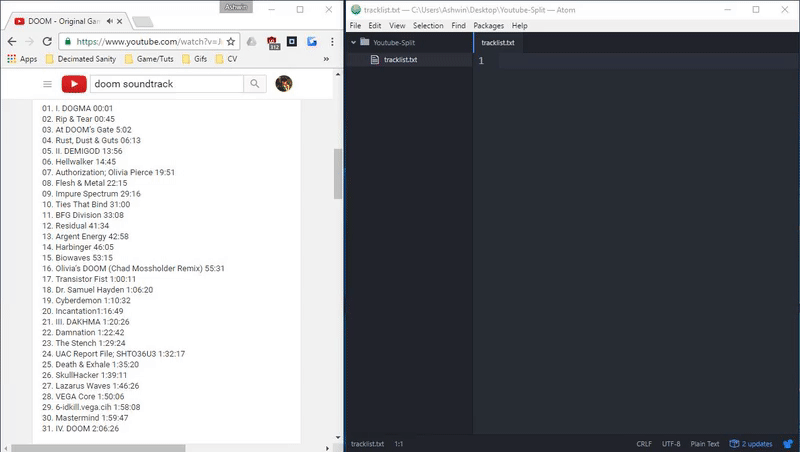|
import sys |
|
import subprocess |
|
|
|
inputfile = sys.argv[1] |
|
codec = '-acodec' |
|
|
|
#ffmpeg did not like having '?' in the file name, add any other problematic symbol here. |
|
escape_list = ['?'] |
|
|
|
def RemoveSymbols(text): |
|
for symbol in escape_list: |
|
text = text.replace(symbol, '') |
|
return text |
|
|
|
tracklist = [] |
|
|
|
class Track: |
|
def __init__(self, timestamp, name): |
|
self.timestamp = timestamp |
|
self.name = name |
|
|
|
class ExtractTracks: |
|
def __init__(self): |
|
with open(sys.argv[2], "r") as values: |
|
for value in values: |
|
name = "" |
|
timestamp = "" |
|
#split all by spaces. |
|
keyVal = value.split(' ') |
|
#find timestamp |
|
for word in keyVal: |
|
if ':' in word: |
|
timestamp = word |
|
else: |
|
name += word + ' ' |
|
tracklist.append(Track(timestamp, name)) |
|
|
|
#Initialize |
|
ExtractTracks() |
|
|
|
|
|
def GenerateSplitCommand(start, end, filename): |
|
return ['ffmpeg', '-i', inputfile, '-ss', start, '-to', end, '-c', 'copy', filename+'.mp3', '-v', 'error'] |
|
|
|
def GetVideoEnd(): |
|
ffprobeCommand = [ |
|
'ffprobe', |
|
'-v', |
|
'error', |
|
'-show_entries', |
|
'format=duration', |
|
'-of', |
|
'default=noprint_wrappers=1:nokey=1', |
|
'-sexagesimal', |
|
inputfile |
|
] |
|
return subprocess.check_output(ffprobeCommand).strip() |
|
|
|
for i in range(0, len(tracklist)): |
|
name = tracklist[i].name.strip() |
|
name = RemoveSymbols(name) |
|
startTime = tracklist[i].timestamp.strip() |
|
if i != (len(tracklist) - 1): |
|
endTime = tracklist[i+1].timestamp.strip() #- startTime |
|
else: |
|
endTime = GetVideoEnd() #- startTime |
|
print('---') |
|
print('Generating ' + name + ' from ' + startTime + ' to ' + endTime) |
|
print('---') |
|
command = GenerateSplitCommand(str(startTime), str(endTime), name) |
|
output = subprocess.check_call(command) |

Thank you for supplying this script.
I would like to make 2 modifications.
I would like to manually/explicitly specify the 'end time' to the nearest millisecond (as well as start time), e.g.: 00:04:32.549
The reason for this, to get rid of 'extended pauses' to more quickly transition to the next song.
I use a GUI program to visually analyze where the end pause first occurs, and manually write down said time, rather than using my hearing.
The 2nd modification I'd like to do, is use ogg vorbis for output method
I presume for the function def GenerateSplitCommand(start, end, filename), could have it's return statement changed to:
return ['ffmpeg', '-i', inputfile, '-ss', start, '-to', end, '-c' , 'copy', ________________ filename+'.mp3', '-v', 'error']
return ['ffmpeg', '-i', inputfile, '-ss', start, '-to', end, '-c:a', 'libvorbis', 'b:a', '128k', filename+'.ogg', '-v', 'error']
I'm concerned this may be in conflict with the statement, codec = '-acodec'
According to the ffmpeg document, that refers to the Ac-3 decoder